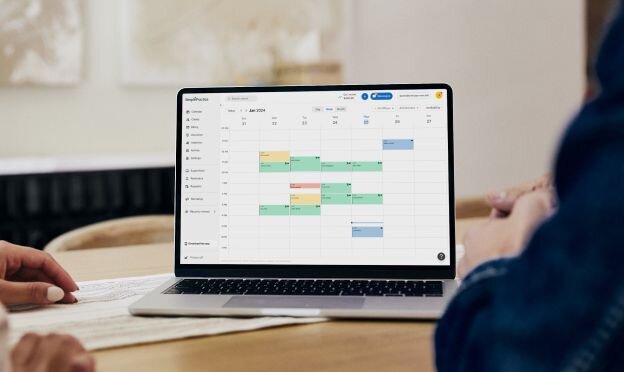Stress ICD-10 Codes
Download the free list of the most common ICD-10 codes
Download free resource
Enter your email below to access this resource.
By entering your email address, you are opting-in to receive emails from SimplePractice on its various products, solutions, and/or offerings. Unsubscribe anytime.

Looking for stress ICD-10 codes? This article provides a list of relevant stress ICD-10 codes, diagnostic information for the ICD-10 code for stress, including acute stress reaction and adjustment disorder, and where to find ICD-10 codes for therapists.
Determining and using the correct stress ICD-10 code is critical for mental health clinicians to diagnose patients, create treatment plans, and receive insurance reimbursement.
To find and apply the correct ICD-10 code for stress, it's important to determine the context and symptoms, since "stress" can fall under several categories.
What are the stress ICD-10 codes?
Finding the right stress ICD-10 code is essential for accurate billing and insurance claim processing in mental health practices.
The ICD-10 (International Classification of Diseases, Tenth Revision) provides comprehensive classification of health conditions and precise coding that can be applicable to various client scenarios, depending on the specific nature and context of the stress being diagnosed.
The ICD-10 code for stress may include any of the following codes:
F43.0: Acute stress reaction
This code is for cases where an individual is experiencing a transient disorder that occurs in response to a significant stressor, including symptoms such as depression, anxiety, mixed emotion, and conduct disturbances.
Acute stress reactions may also be referred to as situational stress ICD-10 code.
F43.2: Adjustment disorders
While not exclusively a "stress code," adjustment disorders are stress-related conditions.
Adjustment disorders are characterized by an emotional or behavioral response to an identifiable stressor(s) occurring within three months of the onset of the stressor(s).
The response is considered clinically significant as evidenced by marked distress that is out of proportion to the severity or intensity of the stressor.
The specific codes that fall under this category include:
- F43.2: Adjustment disorders
- NOTE: This code should not be used for reimbursement purposes as there are multiple codes below it that contain a greater level of detail.
- F43.20: Adjustment disorder, unspecified
- F43.21: Adjustment disorder with depressed mood
- F43.22: Adjustment disorder with anxiety
- F43.23: Adjustment disorder with mixed anxiety and depressed mood
- F43.24: Adjustment disorder with disturbance of conduct
- F43.25: Adjustment disorder with mixed disturbance of emotions and conduct
- F43.29: Adjustment disorder with other symptoms
F43.8: Other reactions to severe stress
This code captures stress reactions that don't fall neatly into the ICD-10 stress reaction (acute) or post-traumatic stress disorder (PTSD) categories, but are nonetheless identifiable as direct responses to significant stressors.
However, code F43.8 should not be used for reimbursement purposes.
Instead, clinicians should use one of two codes below it that contain a greater level of detail:
- F43.81: Prolonged grief disorder
- F43.89: Other reactions to severe stress
F43.9: Reaction to severe stress, unspecified
F43.9—anICD-10 code for stress, unspecified—is generally used when a patient is experiencing stress reactions that are significant enough to warrant clinical attention, but do not meet the criteria for more specific stress-related diagnoses.
Z73.3: Stress, not elsewhere classified
This code might be used for cases where the patient's condition is primarily one of stress, without other specified diagnosis. It's often used in situations where stress is a significant issue but does not fit the criteria for a more specific stress-related disorder.
If you’re looking for the emotional stress ICD-10 code or the ICD-10 code for stress at home, this Z code may be the best fit. This broad code can apply to stress induced by various mental or physical conditions that aren’t related to employment and aren’t specified elsewhere in the ICD-10.
Using the stress ICD-10 code
When using these codes, it's important to ensure that the diagnostic code matches the documentation in the patient's record. Accurate coding is crucial for billing and insurance purposes and for maintaining compliance with healthcare regulations.
Additionally, when submitting insurance claims, providing a detailed description of the patient's condition along with the appropriate stress ICD-10 code can help in the approval process.
Remember, choose the code based on your clinical judgment of the patient and their specific circumstances.
When making a diagnosis, it may also be helpful to consult the American Psychiatric Association’s (APA’s) Diagnostic and Statistical Manual of Mental Health Disorders, fifth edition (DSM-5) alongside the ICD-10—-since the DSM-5 provides criteria and additional context that can assist in selecting the most appropriate code.
Lastly, always stay updated with the latest ICD-10 codes and billing practices, as codes and billing guidelines can change.
How to find the correct ICD-10 code for stress
If you bill insurance, you'll want to confirm that the stress ICD-10 code you select is both up-to-date and billable. You can navigate to the ICD-10 database on the CMS.gov website to search for the code and verify its status.
Other places to identify the correct ICD-10 code include:
- ICD-10 Data, a searchable ICD-10 database
- The World Health Organization version of the ICD-10
- The DSM-5 throughout the textbook and online
Remember, the list of billable ICD-10 codes is updated annually on October 1.
Modernize insurance billing with SimplePractice
SimplePractice is HIPAA-compliant practice management software that makes it easy for you to create, submit, track, and reconcile insurance claims all in one place with client information automatically added to all claims.
Try SimplePractice free for 30 days. No credit card required.

